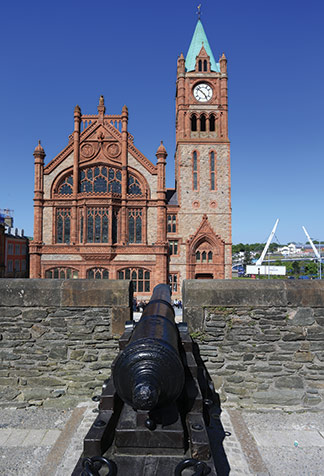Delivering inclusive growth

The proposal for a City Deal for the Derry City Region has placed the expansion of Ulster University’s Magee campus, the regeneration of Derry City centre and Strabane town centre and the upgrading of the A5 and A6 roads at the heart of a bid that could see the region generate an additional £1.1 billion in gross value added (GVA).
Derry City and Strabane District Council’s (DCSDC) proposal has stated that the City Deal’s full potential can only be unlocked if what it calls ‘the catalyst investment priorities’ are delivered upon first. The bid predicts that without the deliverance of these projects taking precedence, the forecasted GVA rise would suffer from a fall of as much as £300 million.
With 4.6 per cent of people in the area registered with the Job Seekers Claimant Court and 37 per cent considered “economically inactive” (students/retirees/homemakers/family carers), it is reported that without the catalyst projects needed to “generate substantial leveraged investment from the private sector and other sources”, these figures would remain above Northern Ireland’s averages of 2.5 per cent and 27 per cent respectively. The City Deal could create 15,100 jobs by 2032 and bring the region’s share of economically inactive people down to the average, but employment projections could fall by as much as 50 per cent without the improvements.
The expansion of the Magee campus aims to increase the number of students to 9,400 and will include the delivery of a new Northern Ireland Graduate Entry Medical School (NIGEMS) as well as laboratories and centres focused on innovation in the fields of advanced manufacturing and technology, intelligent biology and neuroscience-based systems, cognitive analytics and artificial intelligence. Along with providing new GPs for the North West, the NIGEMS will also work closely with the Clinical Translational Research and Innovation Centre (C-TRIC) to facilitate research into genomics and cognitive analytics. C-TRIC and the Cognitive Analytics Research Lab will also play key roles in the redevelopment of Templemore Health & Wellness Centre.
The regeneration of Derry City centre would include the redevelopment of the riverfront area, where DCSDC owns sites with a gross development value of £200 million, to become a business, civic and innovation centre as well as a new river crossing, a redesign of road infrastructure, new modes of public transport, and a tourism project dubbed the Signature Creative Experience to be based in a new landmark building in the Central Riverfront area. Strabane town centre will also see regeneration in an attempt to halt the slide toward edge of town developments. This regeneration will come in the form of a major health hub, a further education campus, a leisure centre and Council Offices.
In a report that illustrates the North West’s need for sustained and significant investment in infrastructure, both physical and digital, DCSDC has also included plans to upgrade the A2 economic corridor, with a four-lane road between the Pennyburn and Skeoge roundabouts and a dual carriageway between the Skeoge roundabout and Elagh Business Park. The development of the A2 corridor will unlock 15 acres of development land, which spells good news for investment if the example of Ebrington’s regeneration is followed; the area is now bringing in £4 of private sector investment for every £1 of public sector money.
Digital Framework plans to build SMART digital infrastructure, invest in digital skills to grow the digital economy and assist businesses to embrace technology have been put in place. In terms of transport, plans have been included to develop City of Derry Airport and Foyle Port and to reduce travel times and increase the frequency of the Derry-Belfast rail line, with through timetabling to Dublin.
To boost employment prospects in the area, DCSDC has outlined several infrastructural initiatives including an apprenticeship and skills hub, skills growth fund, youth investment programme, employer-led skills academies and an intermediate labour market programme, which will see people enter paid work experience for six to 12 months while receiving training and qualifications. Estimates predict that the uptick in employment delivered by these measures will result in £348 million worth of benefits spending being saved and £424 million of tax and PAYE revenue being raised, both by 2032. The area’s average wage is anticipated to be raised closer to the Northern Ireland average of £25,999 per annum; currently standing at £22,906, it is expected to jump to £25,000.
With the enhanced capacity of the Magee campus and 15,000+ jobs to be created, the area, which will see double digit population percentage point decreases in every age group under the age of 65 between now and 2041, will have to welcome an additional 10,000 people. To cope with this, DCSDC says there is a need to build 12,000 new homes by 2037.
The report finishes with a call to action to reform the mechanisms through which councils in Northern Ireland access funding for regeneration projects. Unlike local councils in England, Scotland and Wales, councils here are not permitted to borrow through the Public Works Loan Board (PWLB), which means they are ineligible for the Certainty Discount rate for capital and infrastructure projects.
DCSDC says that access to the PWLB “would unlock or potentially accelerate the significant capital investment plans across local government in Northern Ireland”. By reducing the cost of borrowing, DCSDC argues, additional liquidity within local budgets would allow for the kind of finance capital investment a large and ambitious plan such as their City Deal requires.






